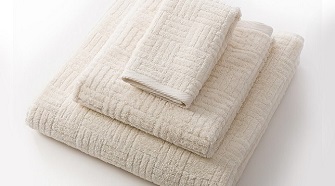
NATIONAL REPORT—As Green Lodging News has learned in its own research and by talking to industry suppliers, there are numerous ways to reduce the environmental impact of a towel. Certainly chemicals and laundry equipment come into play, as does whether or not that equipment is matched with an ozone laundry system. Of course towel reuse programs can make a huge difference as well. But can your choice of the towel itself—how it is made and what it is made from—help you reduce your annual laundry-related costs? Many suppliers say yes and each has its own unique story to tell. Below are some example of towels you can buy today that can have an immediate impact on your carbon, chemical and water footprint.
Berkshire Amenities Group, Inc.—Berkshire Amenities Group, according to CEO Gene Faul, offers Green Earth Eco Towels. The towels are made from superfine extra-long staple cotton. Sustainable eco-friendly dyes and chemicals are also used to help reduce the impact on the environment. As a result, these towels are 160 percent thicker and more absorbent than traditional combed cotton towels. They also launder more efficiently—needing less detergent and less drying time.
Faul says testing has shown the Green Earth Eco Towels can reduce water consumption 14 percent, gas consumption 17 percent and electricity 14 percent. The result: an almost 33 percent reduction in utility costs per occupied room.
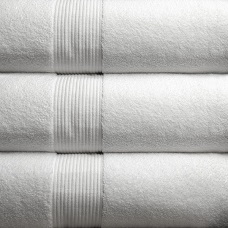
“The Green Earth Eco Towels are doing very well,” Faul says. “They are wonderfully soft and they have a great hand. They don’t snag. It is a really good product.” The towels are made in India at a plant that burns coconut shells to generate energy.
Enova Textile Co.—According to Enova Textile, an estimated 40 percent of cotton that is grown is wasted between its harvest in the cotton field and the manufacturing of a finished garment, equaling approximately 1.2 billion pounds (about 600,000 tons) of cotton fiber which is disposed of by spinning mills, weavers and fabric manufacturers every year in India. This pre-consumer “waste” goes directly into landfills and contributes to the formation of leachate as it decomposes, which has the potential to contaminate both surface and groundwater sources.
“We created a towel made from unused cotton,” says Elliott Lightman, CEO and founder of Enova Textile, whose customers include at least one major chain and two major distributors. “It ends up stronger, whiter and lasts longer. By using the unused cotton, we save millions of gallons of water. The land gets to be used for food. There is energy saved. It is the same price or less expensive than virgin cotton.”
Enova Textile factories collect 96 percent of the water that is used throughout the manufacturing processes, and in an on-site treatment facility, that water is cleaned and distilled to a quality equal to bottled drinking water and can then be used again in any part of the manufacturing process. In making its towels, Enova Textile also uses Global Organic Textile Standard (GOTS) certified dyes and detergents that are reusable, organic or biodegradable, and recycled and distilled water.
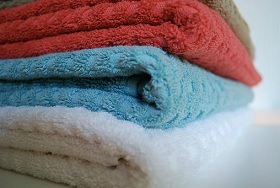
“Our towels have a great story,” Lightman says. “We also apply an antimicrobial finish. It enables the towel to be 99 percent bacteria free for the life of the towel. It really answers a lot of questions for today’s consumer.”
Green Suites Hotel Solutions—Green Suites Hotel Solutions offers an organic cotton bath collection called Sojourn. Dan Bornholdt, owner of the company, says green luxury hotels with four or five diamonds are purchasing the towels.
“The costs are nominally higher than comparable quality towels, but the competitive advantage of the marketing far outweighs any expense,” Bornholdt says. “There may not be 100 hotels in the USA using organic cotton so it’s a rich opportunity for a property stand out above the usual environmental policies we see in the industry. Furthermore, the retail opportunity and profit potential for hotel gift shops and their spas is significant.”
What are the environmental advantages to using organic cotton towels as opposed to standard cotton towels? Bornholdt explains, “Organic cotton is grown in a way that uses methods and materials that lessen the impact on our environment. A big effort in the organic movement is to use growing systems that replenish and maintain soil fertility and build biologically diverse agriculture. Organic cotton uses far less water and causes less soil erosion. The main benefit of organic materials, however, is that the crops aren’t treated with pesticides, insecticides, herbicides and Genetically Modified Organisms.
“Each year cotton producers use as much as 25 percent of the world’s insecticides and more than 10 percent of the world’s pesticides; an incredible amount for just one crop,” Bornholdt adds. “Here in the US alone, more than 10,000 farmers die each year from cancers related to such chemicals. The U.S. Fish and Wildlife Service has also found that pesticides unintentionally kill at least 67 million birds annually in the U.S. These chemicals seep into run-off water after heavy rains, poisoning lakes, rivers, and waterways. Pesticide residue has been increasingly discovered in foods, farm animals, and even breast milk.”
Bornholdt says his company’s towels are lasting up to 50 percent longer than standard cotton towels. To launder them, he says it is ideal to use organic, non-toxic detergents.
Guest Supply—As a leading manufacturer and supplier of textile products to the hospitality industry, Guest Supply has long advocated and emphasized adherence to and leadership in environmental practices. In manufacturing, all of their partners are required to meet international standards on environmental practices and be proactive in developing eco-friendly processes.
Guest Supply is working with the Better Cotton Initiative (BCI). Its focus is on providing training and learning opportunities for farmers to adopt more environmentally, socially and economically sustainable production practices. “BCI helps the farmers get more yield,” says Khushboo Mittal, Category Manager, Bath and Bed Linen for Guest Supply.
Most of Guest Supply’s innovations focus on reducing the carbon footprint of the towel. One of the aspects is to reduce drying time. For example, polyester is used to speed drying time. Guest Supply has developed TruCore, a towel with a polyester core that dries 35 percent faster. It also helps to make the towels stronger, extending the life of the towel.
“We also focus on the weight of the towel,” Mittal says. “We have developed an Air Rich towel that has air pockets to keep it light and more absorbent. Ideally you can wash more pieces and not compromise the quality of the towel.”
Also coming is a towel made with pre-consumer cotton waste. It is called Vitalize.
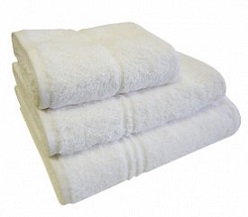
Hartdean—Paul Balladon, Director, Hartdean, says what makes his company’s EcoKnit towels unique is their base construction. “The middle part of the towel is 100 percent polyester,” he says. “They offer up to 50 percent better drying time and at least 30 to 40 percent in drying time savings. You reduce energy consumption and carbon emissions.”
Balladon adds that the towels are less thirsty than standard cotton towels. “Polyester needs less water,” he says. “Cotton needs thirty times its weight in water to launder. Polyester needs 10 times. Our towels require 15 percent less water. Traditional towels last 80 to 100 washes. We can get at least 200 washes. You don’t have to replace them as often.”
“Ours is the LED of towels,” Balladon says. “They cost a little bit more but the savings will pay for that.”
Standard Textile Co., Inc.—Extending the lifetime of a towel is part of the sustainability story behind it and that is what Standard Textile does thanks to its Centium Core Technology, a patented weaving process. The company’s Room Ready for You laundered with Tide program allows hoteliers to use terry right out of the box, saving on upfront laundering costs.
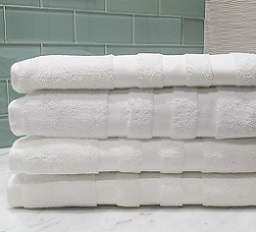
Valley Forge Fabrics—Unique to Valley Forge Fabrics is its use of eucalyptus tree pulp to make Tencel+Plus fiber. This fiber is blended with cotton to make Living Fresh hotel bath towels. According to Valley Forge Fabrics, its towels absorb more moisture than cotton towels and dry 30 percent faster while also helping eliminate odors.
Eucalyptus is a rapidly renewable resource. Properly trained foresters cut the trees 10 to 12 inches above the root bulb, so they grow back to full maturity within five to eight years. Only responsible farming techniques are used to grow and maintain efficient and eco-friendly fiber production. There is only one nontoxic solvent used to convert the eucalyptus pulp to Tencel+Plus fiber, and it is organic. Almost all of the solvent used is then recovered and reused over and over again. Other production methods such as Viscose Rayon Bamboo use 13 toxic chemicals in their process. Forty percent of the eucalyptus trees become the pulp used to create Tencel+Plus fibers. Twenty percent of the remaining tree is used in the production of vinegar and sweeteners. The remaining wood allows the fiber factory to be energy efficient as the wood is burned and converted to electricity. Tencel+Plus saves hundreds of gallons of water with each fiber production, when compared to other natural fibers. In addition, the fiber yield of Tencel+Plus is 10 times higher than conventional cotton.
For this article Green Lodging News reached out to several other companies but did not hear back. Got a story to share about your property’s use of greener towels, write to editor@greenlodgingnews.com.
Glenn Hasek can be reached at editor@greenlodgingnews.com.







